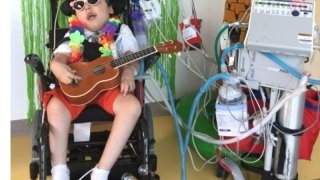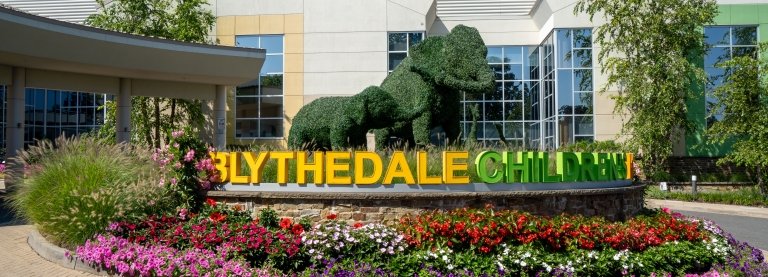Pediatric Long Term Care... and Going Home
- A Message from Larry Levine, President & CEO

Throughout the country, infants and children share geriatric facilities, either in cribs or beds next to the elderly or in designated children’s areas; it makes little difference. Most spend passive, lonely days and nights attached to ventilators and feeding tubes, with minimal stimulation and no path to progress. Few will ever go home.
But there is a better way: Blythedale Children’s Hospital has pioneered a radically different model for long-term care. At the Steven and Alexandra Cohen Pediatric Long Term Care Pavilion, our mission is not warehousing - it is enabling children, whenever possible, to go home. We don’t give up on children here, even the most medically fragile ones. This has been a guiding principle on our inpatient acute rehabilitation units. Through extensive medical and therapeutic team effort and parent involvement, our long-term care team works to maximize each child’s potential, to give every child a vibrant childhood, and to strengthen family bonds and caregiving capabilities. Half of our patients have been discharged home.
Teams of dedicated and compassionate pediatric specialists - doctors, nurses, physical, occupational, speech, respiratory and recreational therapists, nutritionists, psychologists, teachers, child life specialists and social workers - provide constant care and monitoring so that each infant and child can grow and progress to the greatest possible degree. Rather than passively lying in bed, they are busy in infant stimulation programs or early intervention classes or in our attached PreK to 12 school; at their therapies, and at play in a spacious dining hall and indoor and outdoor recreation areas. Our children are nurtured and grow in a dynamic environment of socially and developmentally appropriate services, which, thanks to the vision and generosity of the Cohens, are provided in a spacious and bright pavilion, designed specifically for children. Together, we are setting a new national standard.
Our work is guided by three fundamental premises. The first is that almost no child's potential is fully known, despite their complex medical conditions. Our team of pediatric experts works intensively with each child, assessing changing needs and capabilities and building upon each accomplishment. Muscles are strengthened through therapy and play for children who once lay immobile in cribs or beds. Assistive technology devices teach cause and effect and communication skills, and help children control their environments and interact with family, friends, the clinical team and teachers. Valves are attached to ventilators so babies and children can voice sounds and eventually learn to speak, and whenever possible, they are slowly weaned off their ventilators, or the time on them vastly reduced. Children who have never been able to eat are gradually introduced to the tastes and textures of food and the process of swallowing, and weaned from their feeding tubes. Floppy limbs are strengthened and children progress from strollers to walkers to independent ambulation.
Second, we recognize that our patients are, most basically, children—who need extensive medical care to grow and progress, but also need to be stimulated through play, and to be taught, valued and loved. Birthdays, holidays and other special occasions are celebrated in an intensely child-friendly environment, which has seen everything from Halloween parades to petting zoos. And because every member of our team is working with the goal of helping the child progress, there is an almost palpable buzz of energy and motivation throughout the pavilion.
Lastly, we treat every child as a member of a family, and reinforce family bonds whenever possible. We work to overcome the distancing effect of tubes and monitors and help parents transition from loving the child they expected, to loving the child they have. From the day of admission, parents and other caregivers are trained to be increasingly involved in taking care of their child, and, in many cases, become not only competent, but confident caregivers as they prepare for discharge.
Let me tell you about two of our children:
Maria - delivered at 23-weeks’ gestation and weighing merely a pound - was born with underdeveloped lungs. She had never been home because she was completely dependent on a ventilator to breathe. Between the ages of six months and two years, babies’ weight typically doubles, and their lung tissue grows as well. But the short period that insurance covers for vent weaning didn’t give Maria’s lungs the time they needed to grow; and the long-term care facility where she was initially placed lacked the expertise to wean her from the vent. It also did not offer the therapies and stimulation essential for her to develop and thrive. Then Maria’s parents transferred her to Blythedale. From her first day of admission, they joined in her care. During her time here, she grew into a charming, interactive little girl. We gradually weaned her from her vent, so that she now breathes on her own for 16 hours a day. Our social worker has arranged for nursing care during the night—because her loving family will soon take Maria home.
Tommy, age 4, was born with short-gut syndrome as well as other medical complexities. After many surgeries and a life mostly spent in-hospital, he wore an ileostomy bag strapped to his body, attached with connecting lines, and covered with padding to protect them. Tommy didn’t speak, had never eaten, was not curious about his surroundings, and alternated between passivity and tantrums when he felt overloaded by stimuli. Through intense team effort, Tommy reached the level where he could leave the unit to successfully have surgery to remove his ileostomy bag, and then returned here for further care and therapies. A withdrawn, fragile child has blossomed into an engaged, curious, delightful little boy who can walk and has begun to speak, who enjoys school and is finally tasting ice cream. He will continue school and therapy - but at Blythedale’s out-patient Day Hospital, because Tommy has just gone home. “I would never put a limit on Tommy,” his social worker proudly says.
As every parent holding a newborn knows, we have no idea how far a child can go, nor the limits of his or her possibilities. And the journey is vastly more complicated for babies and children with complex medical conditions. But with the skill, dedication, energy and compassion of a team of pediatric experts and the involvement of family, we give each of our children the best chance possible to reach the place where every child wants to be: home. We call upon long-term care facilities throughout the country to adopt this model. These children deserve no less.



